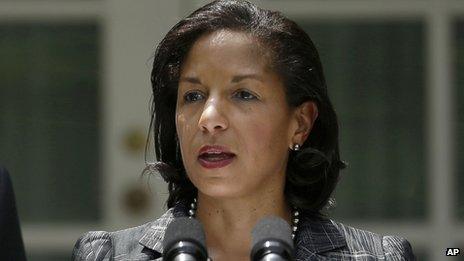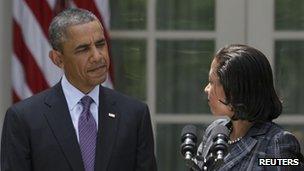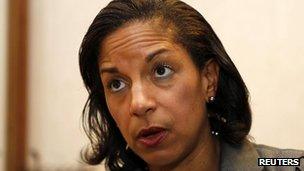Profile: Susan Rice
- Published

Barack Obama chose one of his closest aides when he selected Susan Rice to become his national security adviser.
Her appointment came amid a second-term shuffle of President Obama's foreign policy team. Ms Rice succeeds Tom Donilon, who has held senior national security posts in the administration since President Obama took office.
Ms Rice is known to be a close confidant of the president, but she has also been seen as controversial and has been heavily criticised by some Republicans.
However, there is nothing they can do about this appointment - Ms Rice's new post requires no Senate confirmation.
During his first administration, President Obama appointed her to work in New York as the US ambassador to the United Nations.
Ms Rice was given cabinet rank, in a sign of Mr Obama's plan to work more closely with UN member states than the administration of George W Bush had.

Ms Rice is a close confidant of President Obama
Ms Rice worked in the Bill Clinton administration but backed Mr Obama for the Democratic nomination because of his opposition to the Iraq war.
Although seen as a close ally of the president and a member of his close circle of advisers, in December 2012 she withdrew her name for consideration to succeed Hillary Clinton as secretary of state.
Ms Rice had been at the centre of Republican criticism over the Obama administration's response to a deadly attack on a US consulate in Libya earlier in the year.
When taking up her role at the UN, Ms Rice had already indicated she would advocate tough action to end the killing in Sudan's Darfur region.
She visited Rwanda after the 1994 genocide, while working on the National Security Council.
"I swore to myself that if I ever faced such a crisis again, I would come down on the side of dramatic action, going down in flames if that was required," she said in an interview with the Atlantic Monthly in 2001.
Testifying before the Senate Foreign Relations Committee in April 2007, she supported the idea of military action to force the Sudanese government to halt the massacres.
Rhodes scholar
In her role as UN ambassador, Ms Rice has been credited with representing US interests in negotiations over sanctions against Iran - although some critics say the eventual agreement was not as tough as the US might have liked.
She worked to gain approval in the UN Security Council for military involvement in Libya. But Ms Rice was not able to win support from Russia and China on action against Syrian President Bashar al-Assad.

Susan Rice was the youngest-ever assistant secretary of state
Ms Rice, a protege of former Secretary of State Madeleine Albright, was the youngest assistant secretary of state in history when appointed by Bill Clinton in 1997, dealing with African affairs.
The New York Times reports that the Clinton camp, during Hillary Clinton's campaign for the Democratic nomination, regarded Ms Rice's support for Mr Obama as a defection.
However, she and Mrs Clinton, as US secretary of state, have had to work closely together in the Obama administration.
Ms Rice told the New York Sun that she was drawn to support Mr Obama because of his position on Iraq, saying that he had made "the same unpopular choice I had made" despite huge pressure in Washington to support the war.
Born in 1964, Susan Rice is married to an ABC producer, Ian Cameron, and has two children.
Growing up, Ms Rice dreamed of becoming a senator for the District of Columbia. She graduated in history from Stanford University, then went to Oxford as a Rhodes scholar, where she completed a D Phil in international relations.
During her stint in the Bill Clinton White House, she was described as "brilliant" but also "authoritarian" and "brash". According to the New York Times, she acknowledges "a certain impatience at times".
She is no relation of former Secretary of State Condoleezza Rice.